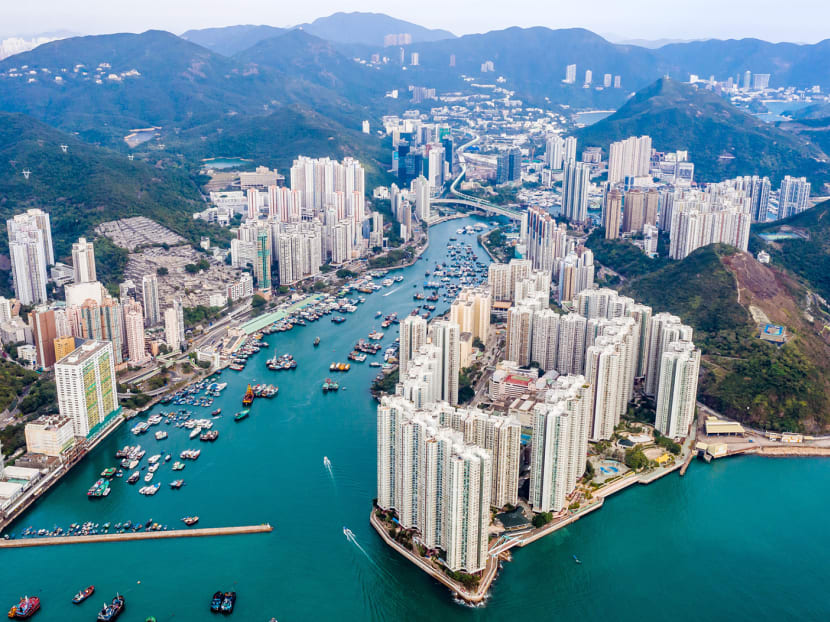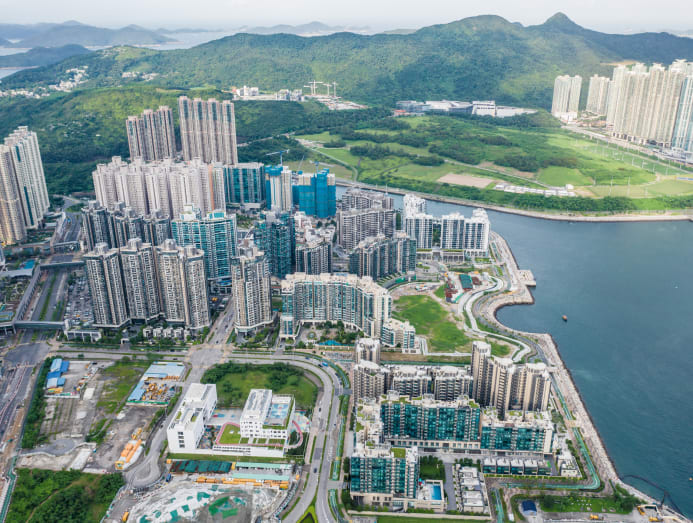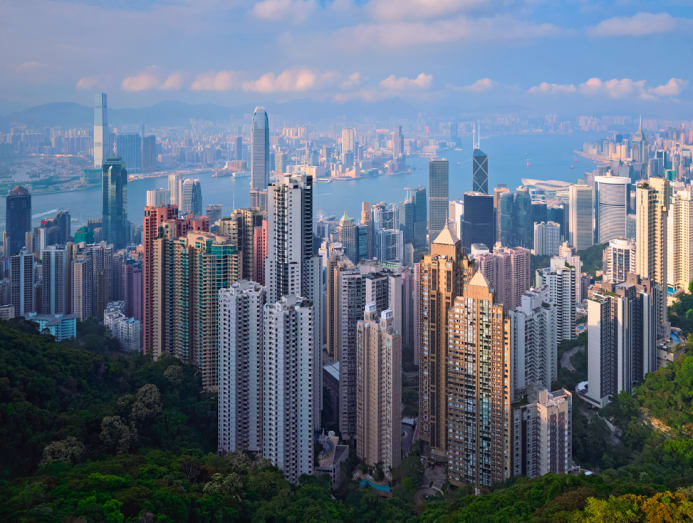In Hong Kong, property prices remain sky-high, despite the challenges
Despite an exodus of expats, the high end of the market is especially hot, with luxury real estate rents increasing for the first time since the end of 2019, say property analysts.

A bird's eye view of Aberdeen, on the south side of Hong Kong Island. (Photo: iStock/Wong Chun Yip)
My apartment in Hong Kong’s Mid-Levels district cost HK$50 million (S$8.6 million) but walking from one end to the other takes just 10 steps. It will probably be the most expensive property – and hopefully the smallest – I ever live in.
I know how much my landlords paid for it because, when signing the lease in January, the estate agent asked if I wanted to sneak a look at the ownership deeds. I took a photo of all the zeroes (a satisfying amount in Hong Kong dollars) so that I wouldn’t convince myself that I had misremembered.
The apartment is on the 42nd floor with views of Victoria Harbour and the Hong Kong skyline, but at about 500 sq ft it is barely larger than a hotel suite. I am often reminded by friends that it is considered large in this city.
Hong Kong has for 11 years been ranked the world’s least affordable housing market, according to an annual report by think-tank Demographia. The median price of a home is more than 20 times the annual median household income, four times the ratio at which a place becomes “severely unaffordable”.
House prices have doubled in real terms over the past decade and reached record highs this year, according to an index by Hong Kong property agency Centaline. Unsurprisingly, the rate of owner-occupied homes is low at 51.5 per cent of households, according to government data, only slightly higher than Germany (46.5 per cent) and far lower than the UK (64 per cent) and Japan (61 per cent).
Rents are the highest in the world and have increased by about three-quarters since 2010, far outpacing wages. The average monthly rent for a 900 sq ft property is almost US$4,000 (S$5,400), only narrowly lower than in San Francisco, according to Expatistan, whose data is used to track the cost of living by institutions such as Deutsche Bank.
Nearly eight per cent of people live below the poverty line, defined in Hong Kong as having an income of less than half the median, but 8.7 per cent have net assets of HK$10 million or more, according to Citibank. According to the 2021 Forbes rich list, Hong Kong had the sixth-highest number of billionaires.
Subdivided flats the size of car parking spaces, known as “coffin homes”, occupy the same cramped city centre as pricey luxury apartments. A new market for “nano apartments” has sprung up because of the lack of space. In 2019, these apartments of 260 sq ft or less accounted for 13 per cent of home sales.

Hong Kong has had more than three years of political and social upheaval. Housing was among the frustrations that formed the roots of the city’s protests in 2019. But so far the protests and, more recently, the pandemic have had little impact on prices.
After a slight dip in confidence at the start of 2020, as the pandemic prompted fears the city would be hit as hard as during the SARS crisis in 2003, sales are booming. Martin Wong, head of research for greater China at Knight Frank, predicts that there will be more than 70,000 residential transactions this year, which would be a record since 2012, and a five to eight per cent increase in residential property prices.
The high end of the market is especially hot. Luxury property rents – homes that are more than 1,000 sq ft and command prices of more than HK$30,000 per sq ft – increased by 1.4 per cent in the second quarter of 2021, according to JLL, the first quarterly rise since the end of 2019. In May, a five-bedroom house on The Peak – a sought-after address that looks over central Hong Kong Island – leased for a record US$2.5 million a year.
Foreigners relocating to Hong Kong for work have long contributed to keeping prices high, fuelled by the large budgets of multinational corporations to house their expatriate employees. But Hong Kong’s strict coronavirus travel restrictions and volatile political situation mean more people are leaving and fewer arriving: Its population fell 1.2 per cent last year, the largest decline since the government started records in the 1960s. Visa approvals for foreign workers dropped to about 10,000 in the first nine months of this year, more than 75 per cent down from the number for the whole of 2019.
The situation has already thrown up quirks. In some cases, senior lawyers and bankers who are staying behind in Hong Kong while their families relocate to their home countries, where travel restrictions are less prohibitive, are moving in together to save costs. Some expat families are being forced to relocate from desirable hillside and beach locations to closer to the city after their corporate housing budgets were slashed as companies reined in expenses during the pandemic.
Wealthy Chinese entrepreneurs have for years buoyed Hong Kong’s high-end property market, seeing it as a safe haven to park money. It has been a particularly attractive investment because of the low interest rates that come from Hong Kong’s currency being pegged to the US dollar. But now, more than ever, all gaps are being plugged, estate agents say, by an increase in Chinese money.
“If you ask around the luxury developers they will immediately say there are more tenants who originate from mainland China,” said Joseph Tsang, Hong Kong chairman of JLL. “So while one part of the expat world is having its budget cut or leaving Hong Kong, there are people coming to fill up the gap.”
China’s stricter capital controls in recent years have made it more difficult to move large amounts of cash over the border, but not impossible, and there are many legitimate ways for Chinese business owners to earn money in Hong Kong. About half of high-end property transactions in the territory are made by foreigners, mostly from mainland China, estimates Wong.

This is also partly down to Hong Kong’s prohibitive mortgage rules that cap borrowing at 50 per cent for properties of more than HK$10 million. This means my landlords, who are from the mainland, had in theory to stump up at least US$3.2 million in cash to buy the apartment.
Now mainland Chinese cash is buoying the upper end of the leasing market too. “The capital controls from China are being tightened but people still want to live in good locations with a good living environment, so hence we’re seeing more PRC entrepreneurs and corporates entering into the leasing market instead of buying,” said Tsang.
Carrie Lam, Hong Kong’s leader, has been under pressure to increase the supply of homes since the protests. In October, she unveiled plans for a “Northern Metropolis” to house 2.5 million people in the New Territories district. The project – which will take 20 years to complete – is aimed at relieving the chronic housing shortage by attracting people to live in a less crowded part of Hong Kong.
It will also become a tech hub close to the border with the Chinese city of Shenzhen, home to China’s biggest tech giants such as Tencent. But the long-term plan is unlikely to have any impact on citizens’ living conditions for now – although some analysts have already predicted it could increase house prices in the area.
The problem for Hong Kong is that it doesn’t have a lot of spare land. About 75 per cent of the territory is protected or too mountainous to build on. As a result, construction in developed areas seems to be relentless. It is a common sight to see new apartment blocks being built in the gaps between two existing towers in an impressively efficient use of space but with little regard for the views from residents’ windows.
Yet demand is far outstripping supply, even with rising prices. The scarcity of land means that buying property is viewed as a long-term game. “It’s still crazy. If there are 100 units in a new building being constructed, it’s normal for it to be more than 10 times oversubscribed, and it will have to go to lucky draw allotments,” said Eunice Tenh, who has been a property agent in the city for more than 15 years.
News that the Hong Kong border with mainland China will reopen by June 2022 is already boosting the market, estate agents say. In November, just days after the border announcement, an apartment on Mount Nicholson in Hong Kong Island sold for HK$640 million, or HK$140,800 per sq ft, a record in Asia.
“The major Hong Kong developers are all very optimistic about the market,” said Tsang. “Hong Kong is still seen as the Monte Carlo of China.”
BUYING GUIDE
Hong Kong is now technically open to non-residents who are fully vaccinated, but anyone relocating or visiting must quarantine at their own expense in a hotel room for 21 days if travelling from 25 countries, including the US and UK, or 14 days from almost everywhere else. The exception is mainland China: Visitors from some provinces can travel without quarantine, although there is a strict limit; most vaccinated visitors from China must quarantine for seven days.
Hong Kong has imposed tough mortgage requirements to try to control prices – to little effect. Buyers must put down at least 40 per cent of the value, and there are steeper rules for buyers from abroad. Mortgage applicants whose income is mainly derived from outside the territory face a maximum loan-to-value of 40 per cent for properties over HK$10 million and 50 per cent below that price.
To put off overseas speculation, Hong Kong has introduced an additional stamp duty for buyers who are not permanent residents, which is a flat rate of 15 per cent of a property’s value.
WHAT YOU CAN BUY FOR…
HK$45.8 million
A three-bedroom apartment on Macdonnell Road in Mid-Levels Central, a short drive from the Central Business District. The property includes an additional maid’s room, balcony and parking space. For sale with Knight Frank.
HK$55 million
A four-bedroom, three-bathroom house with a private pool and garden in a quiet hillside location. There is also a maid’s room, three parking spaces and mountain views, as well as a partial sea view. On the market with Knight Frank.
HK$1.2 billion
A detached four-bedroom house on Island Road in Deep Water Bay, in the south of Hong Kong Island. Built in 2009, the property has a roof terrace with views of the bay and hills. Available through Christie’s International Real Estate.
By Tabby Kinder © 2021 The Financial Times








